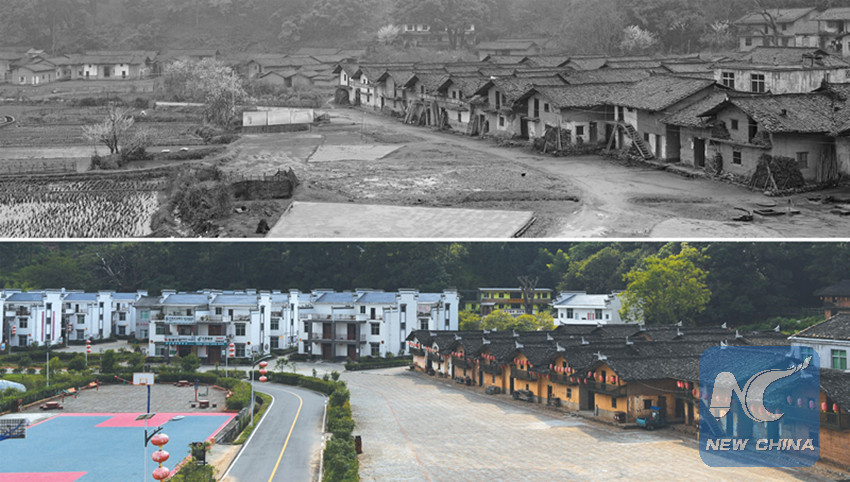
Combined photo shows the Huawu Village before (upper, file photo) and after (lower, taken on Aug. 17, 2017 by Wan Xiang) the renovation work at Yeping township in Ruijin City, east China's Jiangxi Province. Huawu Village, one of poverty-stricken villages in Jiangxi, started renovation and new house building with the help of government in 2013. After 5 years of construction, Huawu villagers moved into new houses early in 2015. (Xinhua)
by Xinhua writer Chen Chen
BEIJING, March 14 (Xinhua) -- China, at the annual session of its top legislative body in Beijing, has pledged to lift another 10 million people out of poverty in its rural areas this year.
The ambitious call for action demonstrates the country's earnest efforts to eliminate poverty, after more than 68 million people have been lifted out of poverty over the past five years.
Through nearly 40 years of reform and opening-up, against the existing rural poverty standards, China has lifted 700 million people out of poverty, more than the total population of the United States, Russia, Japan and Germany, accounting for over 70 percent of the global poverty reduction accomplishments.
Besides, the Asian country has established the world's largest social security system and cut the national poverty rate to 3.1 percent, becoming the first country to complete the United Nations (UN) Millennium Development Goals.
The successful achievements China has made in poverty alleviation have not only promoted the development of its own human rights endeavor, but also greatly contributed to that of the international community.
Today, poverty remains one of the most serious challenges to the fulfillment of human rights, and the elimination of extreme impoverishment has been recognized as a global goal.
As the world's most populous country, China had around 30 million people living below the national poverty line at the end of last year due to unbalanced and inadequate development in different regions, though it has seen a remarkable economic achievement over the past decades.
The grave reality has prompted the Chinese government to set priorities in honoring its firm commitment to improving the people's rights to subsistence and development -- the most primary and basic human rights, as China's State Council recognized in 2016 in a white paper. These two rights are also enshrined and secured in the Constitution and make poverty alleviation a must-do.
To realize the goal of eliminating extreme poverty in the rural areas by 2020, China is carrying out a basic strategy of targeted approach, which requires officials of all levels to clarify who the actual impoverished are and figure out factors that led to poverty. Each household or even each family member would be advised with a bespoke poverty relief plan. In addition, officials who fail to do so would be held accountable.
China's anti-poverty drive has been globally lauded.
China has realized "the most rapid large-scale poverty reduction in human history over the last 25 years," read a 2016 World Bank document, which was released after the World Bank's one-year research of worldwide poverty reduction efforts in partnership with the Chinese government.
"We should not forget the fact that China has contributed the most in world poverty alleviation in the past decade," UN Secretary-General Antonio Guterres said last year about China's poverty reduction achievements.
Though the battle against poverty is hard, China is determined to fight its battle and win, as it is trying to build a society where its people can share the bounties of development. As Chinese President Xi Jinping said: "On the march towards common prosperity, no one must be left behind." Enditem

